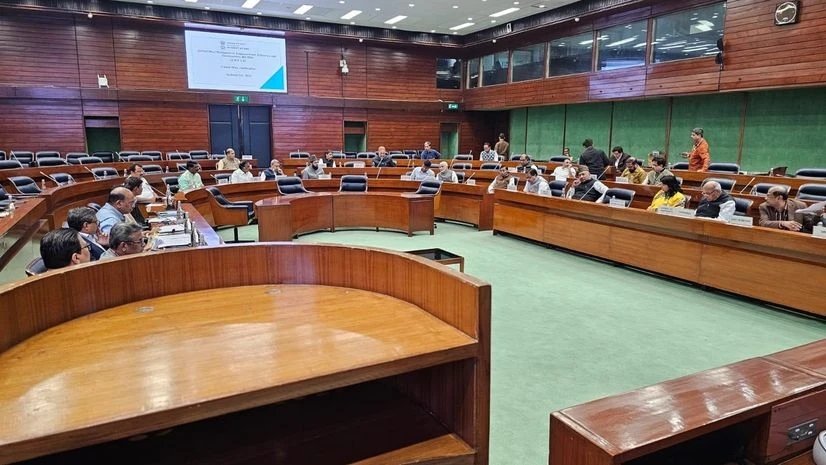A parliamentary panel examining the Waqf Amendment Bill on Wednesday adopted by a majority vote its report that contained changes suggested by ruling BJP members, prompting the opposition to dub the exercise as an attempt to destroy the Waqf boards.
The Joint Committee of Parliament (JPC) on the Waqf (Amendment) Bill, chaired by BJP member Jagdambika Pal, adopted the report on the draft legislation by a 15-11 majority vote. Opposition members were submitting dissent notes to the report.
BJP members insisted that the bill, introduced in Lok Sabha in August last year, seeks to bring modernity, transparency and accountability in the management of Waqf properties, while the opposition termed it as an attack on the constitutional rights of the Muslim community and interference in the functioning of the Waqf boards.
Speaking to reporters after the 38th sitting of the committee, Pal said the report will be presented to Lok Sabha Speaker Om Birla on Thursday and tabled in both Houses of Parliament during the Budget Session beginning Friday.
A key concern of the opposition was the appointment of non-Muslims on the Waqf Board, which they claimed was violative of Article 26 of the Constitution that granted citizens freedom to manage their religious affairs, including establishment and maintenance of institutions for religious and charitable purposes.
"You have violated our rights granted under Article 26 of the Constitution. You talked about Uniform Civil Code, but there are Hindu Endowment Board, Sikh Boards, Christian boards which do not have non-Hindus, non-Sikhs, and non-Christians as members. But why does this not extend to Muslims? This is an attempt to destroy the Waqf Boards," Congress member Imran Masood told reporters here.
At its meeting on Monday, the committee had adopted 14 amendments to the bill, all proposed by BJP members and rejected every change suggested by the opposition members, including Congress, DMK, TMC, AAP, Shiv Sena-UBT and the AIMIM.
In a dissent note to the report, AIMIM chief Asaduddin Owaisi said the last-minute inclusion of the proviso to the clause omitting 'waqf by user' was "wholly unhelpful" as the principle will only be tested in cases where the property is placed 'in dispute', in which case the proviso will not apply.
Seeking to allay fears that the existing waqf properties will be subject to scrutiny after the amended waqf law comes into force, a parliamentary panel had recommended that no cases will be reopened against such properties on a retrospective basis, provided the asset is not in dispute or belongs to the government.
"Any bad-faith actor can institute a litigation over any part of the properties belonging to the 'waqf by user' and consequently prevent it from seeking any protection under the amended Act," Congress member Gaurav Gogoi said in his dissent note.
Gogoi, the deputy leader of the Congress in Lok Sabha, said the Bill allows excessive government interference in the functioning, control and management of waqf and waqf properties in the country.
"...this has a detrimental impact on the community as well as the institution of the autonomy, which are necessary to administer the institution," he said.
In his dissent note, DMK member A Raja said the proviso of 'waqf by user' existed since the time of Prophet Mohammad and any move for its omission would violate the fundamental rights of the Muslim community.
Shiv Sena UBT member Arvind Sawant objected to the inclusion of non-Muslims as members of the Waqf Board.
"Nomination of such non-related members will create chaos as tomorrow the other communities may demand parity in all endowments," Sawant said in his dissent note to the report.
He noted that as far as Hindu endowments are concerned, it is categorically mentioned that only Hindus will be members and office-bearers of the Hindu Endowments for Temples.
"The Waqf Act was made to save and safeguard the waqf properties. However, the proposed amendments to the Waqf Act are going to do the exact opposite. Instead of saving the waqf properties, they will open new ways and avenues to further encroach upon and usurp the waqf properties," Sawant said.
Trinamool Congress (TMC) members Kalyan Banerjee and Nadimul Haque objected to the amendment to the original Act that states if any government property is identified or declared as waqf property, before or after the enforcement of this Act, it shall not be a waqf property.
The amendment states that if any question arises regarding the property to be government property then the issue shall be referred to an officer above the rank of collector, as notified by the state government, for adjudication.
"The said amendment hits the basic tenants of the property laws. The government is not meant to create its property by taking recourse in an unauthorised manner. When the government acts as a trespasser, such unauthorised acts cannot be legalised by the proposed amendment," the TMC leaders said.
YSRCP member Vijay Sai Reddy had submitted his dissent note before resigning as Rajya Sabha member on January 25.

)